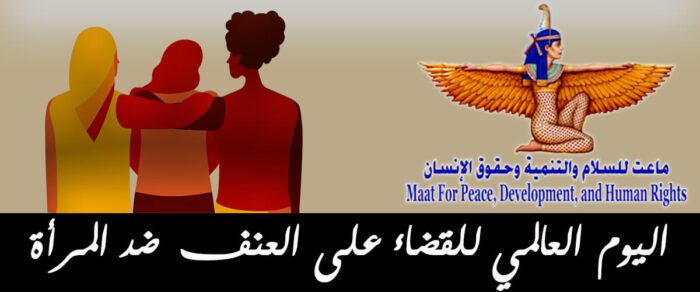On the International Day for the Elimination of Violence against Women ... Maat condemns the total number of violations that African women are subjected to
Maat: We call on the international community to exert more efforts to achieve the fifth goal of the sustainable development goals
Ayman Akil: The suffering of Libyan women should be ended in light of the violent practices of the Al-Wefaq militia
Basant Essam El Din: 95 % of Djiboutian girls undergo circumcision when they are under the age of five
Since 1999, the world has celebrated the International Day for the Elimination of Violence Against Women on November 25 every year, to raise awareness of the problems that women face in all parts of the world and to appeal to the international community to exert more efforts to empower women at all levels.
And based on the interest of Maat Foundation for the rights of African women, the Foundation would like on this day to shed light on the most prominent violations that women and girls suffer from the African continent. As African women are the most vulnerable to violence than others. Violent practices to which women are exposed on the continent are also varied due to civil wars, displacement, forced displacement and poverty, not to mention customs and traditions, making them more vulnerable to violence, sexual exploitation and forced labor.
In this context, the Foundation would like to draw attention to some of the violations that threaten African women. For example, but not limited to sexual violence practices in Libya and female genital mutilation in Djibouti.
In this regard, “Ayman Aqil”, head of Maat Foundation, pointed out the amount of suffering suffered by Libyan women since the outbreak of the crisis, especially the incidents of torture and rape by armed militias, and the rape incidents that occurred by terrorist militias during the year 2019 were estimated at no less than 150 cases. Most notably, the systematic violence in the city of Tarhuna, in northern Libya, after the killing of every woman in the city, as a form of intimidation and intimidation.
Basant Essam El Din, a researcher at the Foundation's African Affairs and Sustainable Development Unit, added to the violations that girls are exposed to, in Djibouti, which comes within the framework of customs and traditions where the phenomenon of circumcision is widespread. Statistics indicate that 95% of girls in Djibouti between the ages of five and nine are subjected to unsafe female genital mutilation. It is estimated that about 400,000 girls are subjected to female circumcision annually in Djibouti.
On the other hand, the Foundation sees several attempts at the global and regional levels to eliminate all forms of violence against women, as the African Union Commission, the United Nations and the European Union signed in May 2020 a historic regional program worth 40 million US dollars represented in the initiative to highlight the judiciary. On all forms of violence against women and girls in Africa, the Foundation continues to call on the international community to exert more efforts to achieve the fifth goal of the sustainable development goals, in terms of equality between the sexes.
Finally, Maat calls on state governments to adhere to the International Convention on the Elimination of All Forms of Discrimination against Women, along with the Protocol on the Rights of Women in Africa attached to the African Charter on Human and Peoples' Rights, and to work towards fully implementing its standards.
Notably, Africa is among the issues of concern to Maat for Peace, Development and Human rights, being a member of the General Assembly for the Economic, Social & Cultural Council (ECOSOCC) of the Africa Union (AU). Moreover, Maat serves as an Observer in The African Commission on Human and People’s Rights (ACHPR) and as a Northern African Coordinator in the major Non-Governmental Organizations (NGOs) in Africa of the United Nations Department of Economic and Social Affairs (UN DESA).











